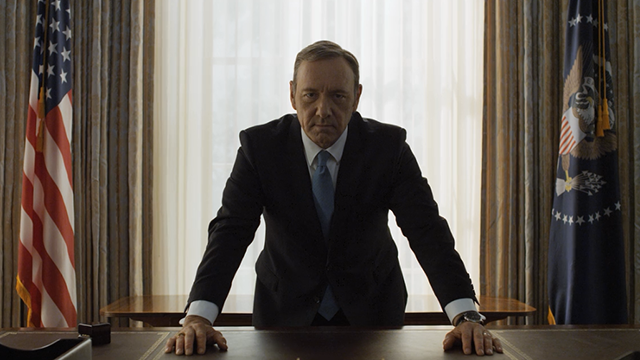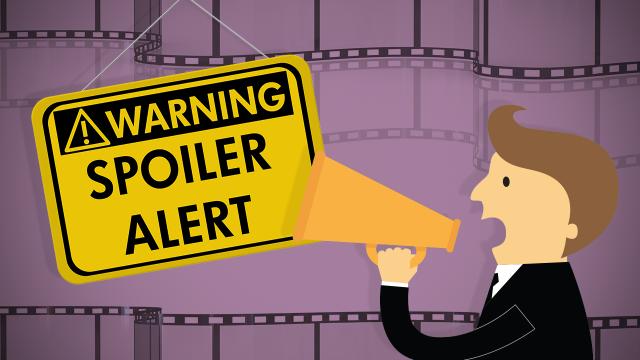The nature of spoilers has changed over the last few years. Between whole seasons being released at once, movies crossing over with TV shows, and books and shows racing each other to the same ending, it’s hard to know exactly where the spoilers line is and how to avoid being that jerk who ruins it for everyone. Fortunately, we have some tips.
The Definition Of A Spoiler

Saying that How I Met Your Mother ends with a main character meeting his children’s mother isn’t exactly a spoiler. Finding out that Rosebud is the sled, however, is. (Sorry, but it’s been over 70 years on that one.) So, what makes a spoiler a spoiler? There’s a few criteria that make something qualify. A plot point becomes a spoiler if:
- The moment is shocking or unexpected: Can you believe Frank Underwood was a cyborg all along? Neither could anyone else who watched the show. And, if that were even remotely true, it would come as a shock to everyone who watches (not to mention severely change the tone of the show).
- The moment is heavily anticipated: OK, fine, we all know that dying is part of Sean Bean’s standard contract. That doesn’t mean we want you to tell us how it happens or even confirm that it does happen. Every Sean Bean death is a unique, beautiful experience. Let us enjoy it on our own.
- The moment is only known from a different medium: To fans of comic books, Thanos the Mad Titan is one of the most ruthless, notorious and powerful villains of the Marvel universe. To fans of the Marvel movies, some purple-faced guy who has yet to be given a name smiled at the camera once. It may be a penalty for being a mega-fan, but if you only know something’s coming in one medium because you read it in another, keep it to yourself.
- The moment isn’t ruined by common promo material: It sucks, but sometimes a show or movie’s marketing ruins the surprises for us. While it might otherwise be a spoiler to reveal that Gandalf returns in The Two Towers, the trailers ruined it already, so you can talk a bit about it. But don’t go overboard. Related: stop doing this, marketers.
It might sound obvious (and if it does, you’re doing it right), but spoilers aren’t necessarily limited to things that are new information, especially in a world where mediums are constantly crossing over. Spoilers are anything that ruin the experience of seeing a show or movie and makes watching it less fun.
Start By Talking Privately

OK, so by these definitions, everything is a spoiler. You still have to talk about it, though. You have to. But how? Talking about TV shows or movies is a little bit like beating a crippling addiction (in more ways than one). You need to start by getting a support group. Establish key people in your social circle that you can confide in and make this group the first people you talk to about the show.
When picking your secret spoiler society, don’t just choose your closest cohorts. Talk to people who watch shows on the same schedule as you. You and your boyfriend might both love Game of Thrones, but if you watch it on day one and he catches the recording in the middle of the week, the tension between you while you wait to sync up could match that of the Lannister/Stark rivalry.
When it comes to online communication, stick to private channels. For the first month or so after a movie or episode comes out, anything beyond “Holy crap that was amazing” should stay out of any and all of the following: Facebook, Twitter, Tumblr, break rooms, dinner tables, comment threads and smoke signals. It is, however, acceptable to share spoilers via private messages, Snapchat, one-on-one conversations and encrypted ravens, provided that all parties involved have either seen the show in question or have explicitly said they don’t mind spoilers. (That includes the ravens.)
When To Talk Publicly

When shows and movies adhered to a strict timeline and everyone was on the same schedule, the timeline was easier to figure out: the day after air for TV shows was fair game. After all, when else are you gonna see it? Reruns? As for movies, you might get a week or two for the cinema. Unfortunately, this doesn’t fit some new models so well. Is the finale to House of Cards just as old as the premiere, or does it stay in spoiler territory for longer because it takes more time to get there?
Unfortunately, there is no simple answer to these questions, since a lot of the issues are dependent on the types of medium your preferred show occupies. Game of Thrones adheres relatively strictly to its source books, so you probably shouldn’t talk about those. Meanwhile the Marvel movies deviate significantly from their source, so sharing something that happened in a decades-old comic may not be a huge spoiler. However, you also shouldn’t assume that anyone besides open fans of comic books (or even novels) are familiar with the source material.
As general rules, you can talk about spoilers publicly if something it meets some or all of the following criteria:
- It’s old enough for the sequel to be out already: You might still get digitally ostracised for mentioning what happened during that first episode of House of Cards season two (you know what I’m talking about), but season one is on the table. No matter what your opinion is on spoiler timelines, if the next movie, season, series, or book is out, discussing the last one is generally not viewed as being spoilery.
- It’s no longer being produced: If you don’t know who shot JR, tough luck. Dallas has been off the air for decades, so don’t expect the world to tiptoe around the ending for you. There may be a grace period for this if a show only recently ended — I’d advise waiting a little while to talk about the How I Met Your Mother ending just yet — but when something’s over, that period doesn’t last long.
- Everyone’s already talking about it: Some spoilers take on a life of their own. Last year, the phrase “Red Wedding” was more popular than the NSA’s scandalous PRISM program (I wish this weren’t true). Fighting spoilers on the internet is an uphill battle but sometimes the battle just gets lost. Don’t be the jerk who’s the first one to call out specifics — saying “Red Wedding” is one thing, but detailing how Robocop showed up to kill Joffrey is quite another — but you can follow popular trends to see what is and isn’t OK.
Of course, even with all these rules, there’s still one that trumps all the others: staying silent is always better than spoiling. As long as you have some people to share a show with, there’s rarely a pressing need to explicitly call out spoilers in a public forum. When in doubt, keep it to yourself.
And most importantly, always, always, always, always, always, always use spoiler tags. Or else.

Comments
18 responses to “How To Avoid Spoiling TV Shows And Movies For Everyone Else”
Sean Bean dies at the end.in almost every film he’s been inYeah, the worst I hate is people that spoil and talk matter of fact. Oh but you know such and such has to die.
Once someone literally said to me about a TV shows final episode, ‘It’s quite boring, not much happens. Although *main character* dies.’
I had what happens in this weeks GOT ruined for me months ago. I am not happy. Then some follow up that was also said is probably ruined. Even if you don’t know for certain you just wait for it. A couple tiny details ruin things.
It’s just annoying how people spurt crap out as if it’s known. I actually honestly wonder if sometimes people have it ruined for them, or in this case (as I don’t think they’ve read the book) they ventured into spoiler land, then have to ruin it for other people because it was ruined for them. Some immature version of breaking a toy so another kid can’t enjoy it if they can’t.
Friends of mine who watch GOT and have read the books are really good at keeping things secret. I think they loved the books and want people to like the show and be surprised. It’s people who don’t, who then ruin it for themselves that are the problem.
Often the problem isn’t so much that people are spoiling – it’s that they don’t know certain things are spoilers, when they really are. I wrote a blog post about it.
http://blog.pananda.com.au/2014/04/06/spoiler-policy-a-refresher/
Hodor said “Hodor”Wow. I can’t understand people who get so butthurt over spoilers. Grow up. The plot of a movie is not the only enjoyable element.
That’s like saying “Sure, I threw your potatoes on the floor and stomped on them. But that’s not the only enjoyable part of the meal. Grow up.”
To which you reply, “YOU RUINED EVERYTHING! RUINER!!! I HATE YOU!” as you stomp out of the restaurant.
Being so concerned about spoilers is childish. It’s like not turning up to your own surprise birthday party because somebody accidentally told you.
You can’t “ruin” the plot of a movie. The plot still holds artistic value regardless of whether you know what’s going to happen or not.
What the hell are you talking about?
You’ve invented this idea that people who are spoiled then don’t bother watching it at all. That’s not the case, and a silly assumption.
It’s completely fair to tell someone they’ve done something stupid and thoughtless when they’ve done something stupid and thoughtless.
Secondly, ‘artistic value’ is irrelevant, it’s about using the tools of film language to engage an audience. How and when the filmmaker communicates information to the audience is a key tool. People who spoil things take that tool away from the filmmaker.
But it’s really as simple as this: watching knowing what is going to happen is one experience. Watching not knowing what is going to happen is another. By spoiling someone, you’re removing their ability to choose which one they’d like, or to get both.
What the hell are you talking about?
What you might think of as “stupid and thoughtless” is in fact such a minor part of life that complaining about it makes you look like a petulant child.
If TV shows and / or movies are so important to you that you think it’s such a bad thing to know the outcome beforehand, then you clearly need to re-assess your priorities.
You’re talking about “THE RIGHT” to choose as if you’re discussing abortion. How entitled have you become that you think this is even a big deal?
…if it’s not worth discussing, why the hell are you discussing it?
Stop taking things to ridiculous extremes. Are spoilers my biggest priority? Of course not. Do I still not want them? Yes.
If someone throws poo at your face, and you complain, is it a legitimate response to say “I can’t believe you’re worrying about a bit of poo on your face when PEOPLE DIE OF CANCER.” ?
You seem to have noticed you don’t have a leg to stand on, and are instead huffing about how you don’t think we should be talking about this anyway.
Lol! Apply your own standards. Knowing the outcome of something is not that same as having faeces thrown at your face!
Keep huffing and puffing until you pass out, that’s what kids do, isn’t it? Again, just grow up.
WAIT. What? Having a plot spoiler is not literally the same thing as having poo on your face?
Oh my, whatever was I thinking? Obviously madness. It’s almost as if I knew they aren’t the same thing, and was using some kind of literary device to compare two other things. But that’s not possible! No, we can only talk in completely literal terms at all times! It can’t possibly be an example of how it’s fine to complain about things even if there are more serious matters that could be complained about.
Given your stunning inability to understand such a basic method of debate, it seems pointless to try to convince you of anything.
But here’s a little pointer for you: if you can’t actually counter someone’s argument, and just angrily tell them to grow up, it probably means you’re wrong.
Hey guess what? If you can’t counter someone’s argument, making childish analogies which prove how vacant your argument is of substence definitely means you’re wrong. Sarcasm on top of that just makes you look stupid.
You know why your attitude is childish? Because you’re working on the basic assumption that you are more important than everyone else around you. The assumption that your enjoyment of a TV show or movie (extremely trivial parts of life at best) trumps the ability of every single person around you to talk about it is childish and arrogant.
What’s more, you seem to believe that they’re doing it with intent, implying that you are their sole focus, to the point where they deliberately go out of their way to upset you.
You *do* need to grow up.
How do you not spoil shows? Just don’t f$&king do it by being an insensitive douche.
“insensitive” – you seem to take it so personally, as if somebody’s hurting your feelings.
Bible spoiler:
Jesus dies, but then he gets better.Comment system broken. This shouldn’t be here.